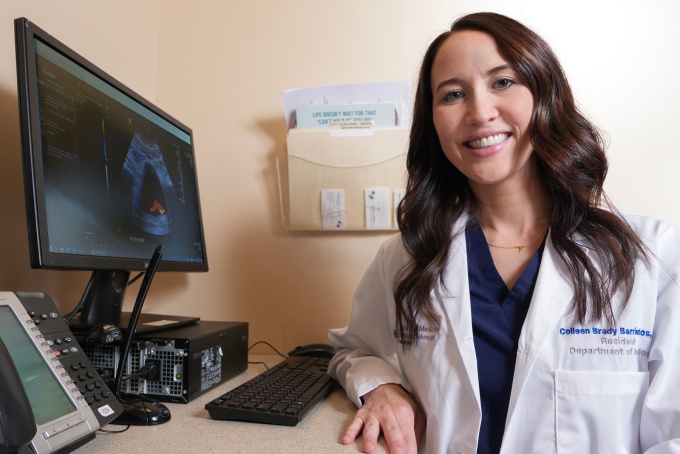PGY-1

First-year residents, such as Colleen Barrientos, MD, train for six months in urology and six months in general surgery.
In your crucial first year, we’ll provide you with direct, supportive supervision throughout your clinical training.
As a first-year resident, you’ll train for six months in both urology and general surgery, and both programs will introduce you to the basic principles, methodologies and practices of the diagnosis and management of patients.
We’ll familiarize you with the indications and limitations of the various diagnostic techniques available, as well as pre-, peri-, and post-operative care.
Under the guidance of senior residents, chief medical residents and our seasoned faculty members, you can expect to:
- enhance your clinical knowledge and comprehension of current biomedical science — and apply this knowledge to help solve patient problems
- investigate and evaluate your own practices of patient care
- evaluate and use best evidence in patient management
- strengthen your communication skills to ensure you’re engaging in appropriate, effective and HIPAA-compliant interpersonal exchanges
- improve your bedside manner in the outpatient setting
- discuss patients’ treatment options, risks and potential complications
- assist in the performance of urology procedures
We’ll introduce you to urologic procedures such as ureteral catheterization, urethral dilation and retrograde pyelography.
Are you eager to become proficient at evaluating and interpreting different diagnostic modalities? Through teaching conferences, case discussions, use of extensive departmental self-learning resources and independent study, you can increase your abilities in interpreting urograms, MRIs, urodynamics, cystometrograms, ultrasounds, X-rays and contrast studies, as well as CT scans.
Surgical Experience
In our program, we ensure that you start gaining skill with basic surgical techniques right from the start of your training.
As a PGY-1 resident, you will train for six months in urology and six months in general surgery. You’ll be present at all surgical procedures, including open and endoscopic procedures. Initially, you’ll function as an assistant, observing and learning operative procedures and techniques.
As you progress, with the guidance of our faculty and senior residents, you’ll perform portions of general surgery and urologic operative procedures and techniques.
These opportunities to perform portions of surgery will acquaint you with a range of procedures and will train you to familiarize yourself with the history and findings of each patient you encounter.
You’ll follow patients from their pre-operative through their post-operative course. You’ll also learn about long-term follow-up with clinic patients.
Additionally, along with a faculty member — as well as second-year and fifth-year residents — on a daily basis you’ll round on all urology and general surgery patients and review and discuss their cases.
You’ll begin to learn endoscopy by observation, and later you’ll have opportunities to perform procedures with guidance from our faculty. Your first year of training is when you’ll start to acquire skills in cystoscopy, ureteroscopy, nephroscopy and laparoscopy. You’ll have plenty of opportunities to refine these skills throughout your subsequent years of training.
Robotic Surgery
Your robotic-surgery training will begin with an online introductory program followed by an in-service course focusing on the basics.
We’ll ask you to be present at all robotic surgery procedures.
At the outset, you can expect to become proficient in patient positioning, port placement and docking.
Rotations
Rotations during your first year will help you expand your knowledge of urology and general surgery and will increase your confidence in the diagnosis and management of urologic patients.
Urology rotations
| Location | Duration |
|---|---|
| Buffalo General Medical Center | 1 month |
| TICU at the Erie County Medical Center | 1 month |
| Erie County Medical Center | 1 month |
| Millard Fillmore Suburban Hospital | 2 months |
| Buffalo VA Medical Center | 1 month |
General surgery rotations
| Location | Duration |
|---|---|
| Buffalo General Medical Center | 1 month |
| Millard Fillmore Suburban Hospital | 2 months |
| Erie County Medical Center | 3 months |
Didactics
Although you are not required to present at conferences during your first year, we’ll ask you to attend them.
While on both surgery and urology rotations, you’ll maximize your training by attending all urology grand rounds conferences, morbidity and mortality conferences and tumor board conferences.
Also, when on a urology rotation you’ll attend journal club, basic science conferences, Weider’s conference, surgical skills conference and research conference.